Chimes at Midnight Blu-ray Movie
HomeChimes at Midnight Blu-ray Movie 
Criterion | 1965 | 116 min | Not rated | Aug 30, 2016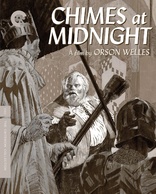
Movie rating
7.8 | / 10 |
Blu-ray rating
| Users | 0.0 | |
| Reviewer | 4.0 | |
| Overall | 4.0 |
Overview
Chimes at Midnight (1965)
The career of Shakespeare's Sir John Falstaff as roistering companion to young Prince Hal, circa 1400-1413.
Starring: Orson Welles, Jeanne Moreau, Margaret Rutherford, John Gielgud, Marina VladyNarrator: Ralph Richardson (I)
Director: Orson Welles
| Drama | Uncertain |
| War | Uncertain |
| History | Uncertain |
| Comedy | Uncertain |
Specifications
Video
Video codec: MPEG-4 AVC
Video resolution: 1080p
Aspect ratio: 1.67:1
Original aspect ratio: 1.66:1
Audio
English: LPCM Mono (48kHz, 24-bit)
Subtitles
English SDH
Discs
50GB Blu-ray Disc
Single disc (1 BD)
Playback
Region A (locked)
Review
Rating summary
| Movie | 4.0 | |
| Video | 4.5 | |
| Audio | 3.5 | |
| Extras | 3.5 | |
| Overall | 4.0 |
Chimes at Midnight Blu-ray Movie Review
Reviewed by Jeffrey Kauffman October 3, 2019What’s your general perception of Orson Welles post-, say, Touch of Evil? Washed up? Dissolute? An unintentionally comic souse, as revealed in the infamous outtakes from a Paul Masson commercial which has become a viral internet meme? Both a mere shadow of his former self and a morbidly obese version of that former self? All of that is probably within the realm of arguable “reality”, and yet Chimes at Midnight serves as an object lesson that perceptions are not always reality. Yes, Welles is physically enormous in this film, but it suits his character of Sir John Falstaff to a tee. But Welles’ intellectual acumen and stylistic flourishes are also fully on display, and if this film isn’t as bracingly shocking as Citizen Kane, it is nonetheless a towering achievement that manages to combine and redact several plays by one William Shakespeare, while also offering Welles a chance to offer a series of really strikingly framed tableaux with a number of hyperbolic characters who strut and fret their hour on the stage (so to speak).
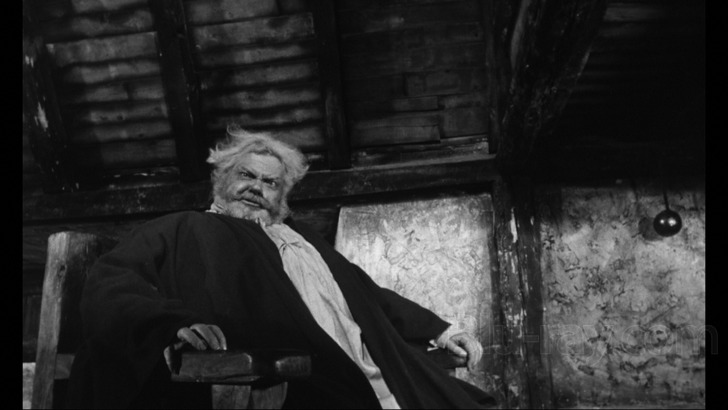
Welles’ familiarity with this material stretched back decades, including an adaptation called Five Kings which was a pet project of his and the Mercury Theater, though as with so many of Welles’ projects, both cinematic and otherwise, what started out promisingly ended up in at least chaos, if not near disaster. Welles never gave up his idea of consolidating several Shakespeare plays in order to concentrate on a story involving Falstaff and his kind of quasi father — son relationship with Prince Hal (Keith Baxter). The film in its own way mirrored Welles’ experience with Five Kings, though, with a series of misadventures, including repeated funding issues, that made the shoot a challenge, including having to deal with various actors not being present all of the time.
But despite the challenges, Welles visually at least managed to deliver, with the help of cinematographer Edmond Richard, a consistently interesting viewing experience. While there are quirks galore (as in heraldic trumpeters who seem to be doing some kind of dance while they play), the film has a number of surprisingly ravishing images, at least given the down and dirty ambience of many of the characters. But my hunch is what has tended to sink Chimes at Midnight through the years for at least some audience members, and may continue to provide at least a bit of a hurdle to others watching this Blu-ray, is the soundtrack. It’s completely obvious that large swaths of this film were post- looped, and not always very well. As some boutique labels are sometimes fond of saying in their technical specs, “sync can appear to be loose”, and that makes watching scenes where lip movements are obvious quite a bit out of whack at times. It’s no coincidence that Welles shot so many of the scenes with actor’s backs to the cameras, or without a clear view of their mouths moving. And when the imagery is divorced (if tangentially or intermittently) from actual dialogue, as in some of the battle scenes, the film’s sound design is quite striking and well fashioned.
There’s a rather ribald, “loosey-goosey” aspect to this film that is in its own way quite delightful, if not traditionally “Shakespearean”. Among the many “chits” Welles called in to fill his cast with well known names include John Gielgud as King Henry IV, Jeanne Moreau as Doll Tearsheet, Fernando Rey as the Earl of Worcester, and a daft Margaret Rutherford as Mistress Quickly.
Chimes at Midnight Blu-ray Movie, Video Quality 
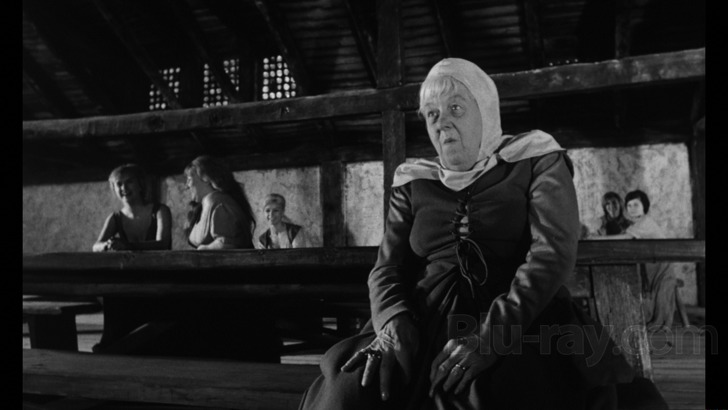
Chimes at Midnight is presented on Blu-ray courtesy of The Criterion Collection with an AVC encoded 1080p transfer in 1.67:1. The mini- poster mentioned in the supplements section below has the following information on the transfer printed on the reverse side:
Chimes at Midnight is presented in its original aspect ratio of 1.66:1 [sic]. On standard 4:3 televisions, the image will appear letterboxed. On standard and widescreen televisions, black bars may also be visible on the left and right to maintain the proper screen format. Based on the 2009 restoration supervised by Luciano Berriatua at the Filmoteca Espanola, this high definition digital transfer was created from the 35mm original camera negative and a 35mm optical soundtrack element. Additional image and sound restoration was undertaken by the Criterion Collection. Dirt, debris, scratches, splices and warps were removed using MTI Film's DRS, while Digital Vision's Phoenix was used for jitter, flicker, small dirt, grain and noise management. Clicks, thumps, hiss, hum, and crackle were manually removed using Pro Tools HD and iZotope RX 4.Considering the fact that this film fell out of favor for quite a while and my hunch is wasn't curated all the carefully in the interim, this is a rather stunning looking transfer which admirably recreates the almost chiaroscuro black and white look that Welles was going for. Welles' penchant for unusual framings, often with faces incredibly close to the camera, helps to elevate fine detail levels, with fine detail on elements like Falstaff's mottled nose quite remarkable at times. The kind of autumnal or wintry ambience of much of the outdoor material looks stark but weirdly inviting, and depth of field is also very good in a number of shots looking out onto various vistas. There are a few variances in contrast and general detail levels, with a few interior scenes looking slightly soft, especially in midrange shots. There are a few very minor signs of age related wear and tear that have made it through the restoration gauntlet, but nothing that I personally would term very distracting. Grain resolves naturally throughout the presentation, and I noticed no compression anomalies. For what has arguably been a neglected piece, Chimes at Midnight looks wonderfully sumptuous in this transfer.
Chimes at Midnight Blu-ray Movie, Audio Quality 
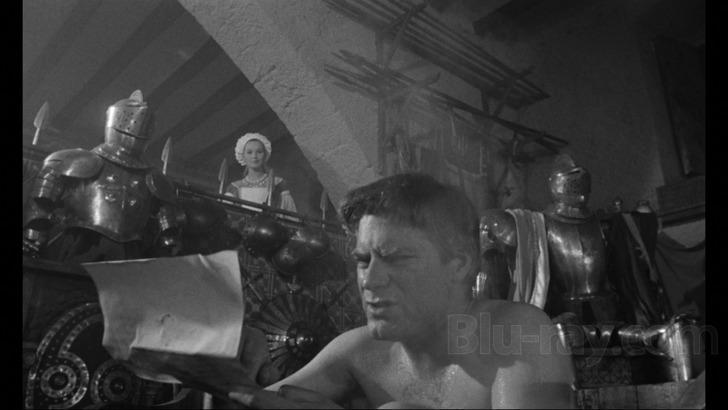
Chimes at Midnight features an LPCM Mono track which is certainly the clearest I've ever heard the film, but which unavoidably carries over the "loose sync" proclivities I mentioned above. That said, this film has some really fascinating sound design elements, and dialogue, while occasionally hard to decipher (optional subtitles are available, and in fact recommended by yours truly), is generally rendered with excellent fidelity. Effects and score sound fine, if perhaps just a trifle thin at times. The main soundtrack doesn't have any big issues, but there are a couple of noticeable pops right at the beginning and end that probably could have been eliminated with some judicious editing.
Chimes at Midnight Blu-ray Movie, Special Features and Extras 
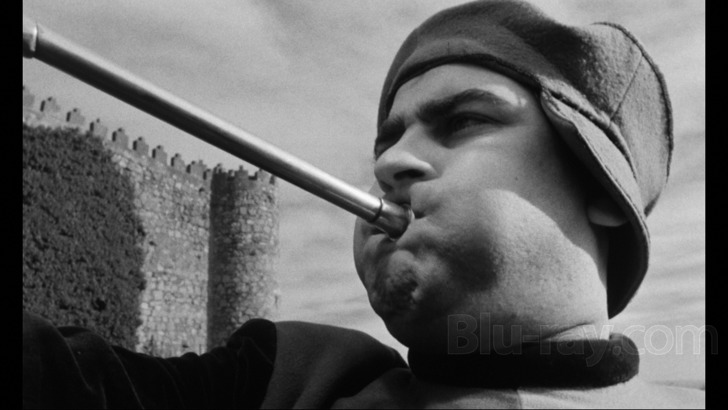
- Audio Commentary features James Naremore, author of The Magic World of Orson Welles.
- Keith Baxter (1080p; 29:49) is an interesting 2016 interview with the actor, who discusses the role of Prince Hal and his relationship with Orson Welles.
- Beatrice Welles (1080p; 14:40) contributes some memories of the production in this worthwhile 2016 interview.
- Simon Callow (1080p; 31:41) offers Callow, no stranger to either Shakespeare or Orson Welles, giving his assessment of Welles' approach.
- Joseph McBride (1080p; 26:44) features the author of What Ever Happened to Orson Welles? in a discussion of this film and Welles' later career in general.
- The Merv Griffin Show (1080i; 11:07) features a 1965 appearance by Welles while he was at work on post-production editing of Chimes at Midnight.
- Trailer (1080p; 1:50)
Chimes at Midnight Blu-ray Movie, Overall Score and Recommendation 
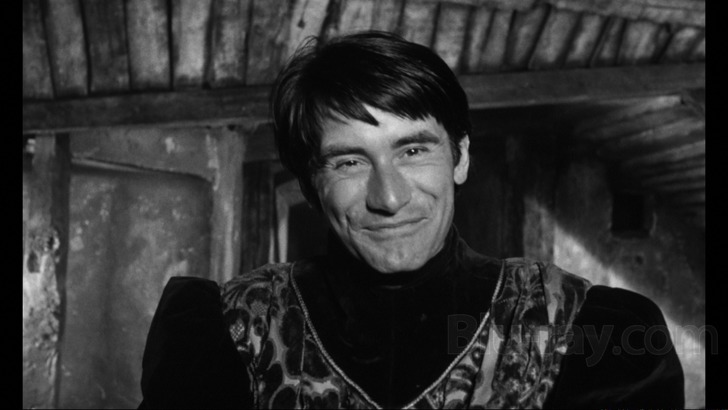
Welles was on record stating that Chimes of Midnight was his own personal favorite of his films, and it has an inestimable charm despite some of the technical challenges that things like the "loose" soundtrack may offer to some viewers (and/or listeners). The film is really a remarkable redaction and reordering of several Shakespeare plays, and anyone who is a student of The Bard will have a field day trying to properly identify just what plays Welles utilizes for any given scene. While Welles' performance is suitably larger than life, it's the wonderful supporting cast that really gives this film a lot of its flavor. Technical merits are solid, and the supplementary package very appealing. Highly recommended.
Similar titles
Similar titles you might also like

Richard III
1955

Macbeth
Special Edition
1948

Henry V
1944

Kagemusha
影武者
1980

Becket
1964

Macbeth
The Tragedy of Macbeth
1971

Othello
The Tragedy of Othello: The Moor of Venice / 1952 and 1955 versions
1951

Joan of Arc
1948

The Fisher King 4K
1991

Edward II
Slipcover in Original Pressing
1991

Hamlet
1948

Foolish Wives
1922

The Crusades
1935

To Be or Not to Be
1942

A King in New York
1957

The Great Dictator
1940

Army of Shadows
L'armée des ombres / Better encode than 2011 release
1969

Intolerance
Intolerance / The Mother and the Law / The Fall of Babylon
1916

The Pillars of the Earth
2010

Age of Uprising: The Legend of Michael Kohlhaas
2013